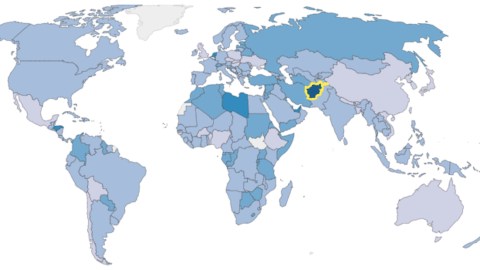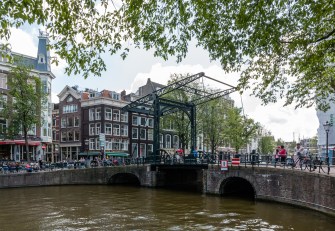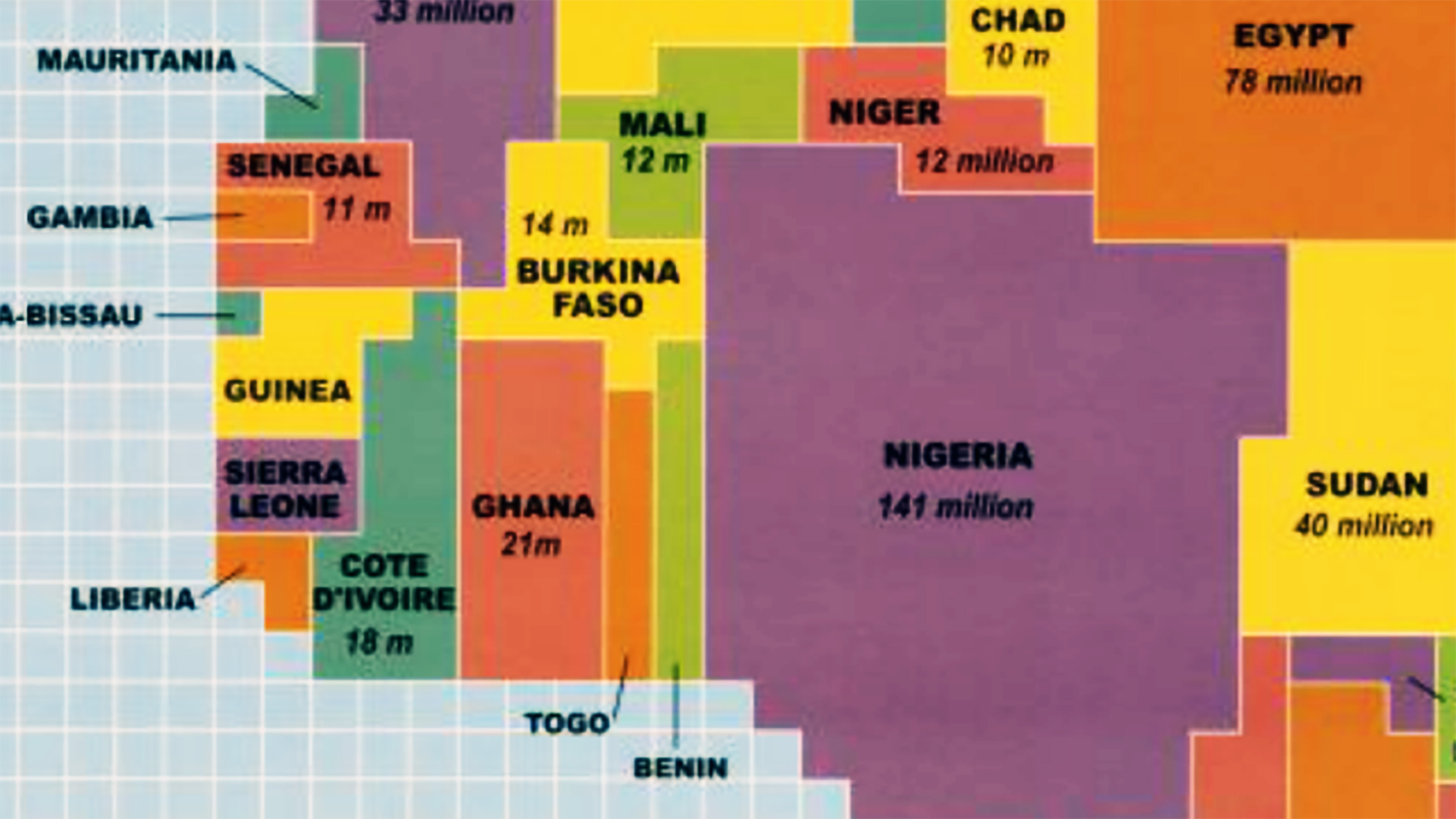Afghanistan is the most depressed country on Earth

Image: Our World in Data / CC BY
- Often seen as typical of rich societies, depression is actually more prevalent in poor, conflict-ridden countries
- More than one in five Afghans is clinically depressed – a sad world record
- But are North Koreans really the world’s ‘fourth least depressed’ people?
Depression is a type of affluenza: one of those mental illnesses that afflict people in rich societies in particular. It’s more likely to occur when the more fundamental levels that make up Maslow’s pyramid of needs — food, shelter, security — are met.
Or, as your Right-wing Uncle is wont to proclaim: People in poor countries don’t have the leisure to be depressed! It’s part of his pessimist cultural determinism: wealth breeds weakness, poverty requires strength. Hello, civilizational collapse!

Afghanistan is the most depressed country on earth, Japan the least (no, not South Sudan – it’s playing its usual role as the biggest data hole on the world map – see also #843)
Image: Our World in Data / CC BY
A world map of depression
Turns out Uncle Burt’s bit of folk wisdom belongs in the dustbin of history. As this map shows — with some notable exceptions, granted — it’s not the richest countries that suffer from the highest rates of depression, but the most violent, the poorest and the most unequal ones. Darker means more depressed.
The data comes from the study “Burden of depressive disorders” (by Ferrari et al.), published in PLoS Medicine in 2013. The study shows that just over 4 percent of the world’s population is clinically depressed — but that rate varies greatly per country.

Bridge crossing a canal at Kloveniersburgwal in Amsterdam, the Netherlands.
Image: Dietmar Rabich / Wikimedia Commons / 2015 / CC BY-SA 4.0
Depression, a Dutch disease?
The Top 10 goes like this:
- Afghanistan: 22.50%
- Libya: 9.27%
- Honduras: 9.22%
- Palestine: 9.01%
- Bahrain: 8.62%
- United Arab Emirates: 8.12%
- Netherlands: 8.03%
- Qatar: 7.99%
- Jordan: 7.73%
- Kuwait 7.51%
As suggested by Afghanistan’s abnormally high rate of depression, decades of armed conflict and economic misery can have a devastating effect on the mental health of a population. The same goes, mutatis mutandis, for Libya, Honduras, and Palestine.
A bit more puzzling is the strong representation of Middle-Eastern countries that are relatively peaceful and affluent: Bahrain, the UAE, Qatar, Jordan and Kuwait. With just over 8 percent of its population clinically depressed, the Netherlands is the only European country to make the Top 10.

Street view of Tokyo, Japan.
Image: Luca Sartoni / Wikimedia Commons / 2018 / CC BY-SA 2.0
North Korea, even less depressed than China?
With less than a third of that percentage, Japan is the least depressed country on Earth. Just like the Top 10 was dominated by a region (i.e. the Middle East), the Bottom 10 is anchored in East Asia, with both Koreas, Taiwan and China dominating the list.
- Japan: 2.46%
- South Korea: 2.48%
- Taiwan: 2.50%
- North Korea: 2.61%
- Mexico: 2.96%
- China: 3.02%
- Nepal: 3.04%
- Australia 3.05%
- United Kingdom: 3.12%
- Czech Republic: 3.23%
The others are Mexico (just under 3% depressed), Nepal, Australia, the U.K. (mind you, these figures predate the Brexit referendum) and the Czech Republic.

Manhattan, seen from the Empire State Building. Image source: Dietmar Rabich / Wikimedia Commons / 2012 / CC BY-SA 4.0
Just how depressed is the ‘rich countries club’?
Where does the United States figure in all of this? This overview of the 36 member states of the OECD — the “club of rich countries” shows that its members are all over the shop: from the Netherlands (7th most depressed country worldwide) all the way to Japan (least depressed country), showing a variation of almost 5.5 percentage points.
- Netherlands: 8.03%
- Estonia: 6.75%
- Turkey: 6.74%
- Luxembourg: 6.55%
- Latvia: 6.21%
- Switzerland: 6.16%
- Finland: 5.98%
- Norway: 5.94%
- Denmark: 5.07%
- Austria: 5.01%
- Greece: 4.87%
- Germany: 4.85%
- Italy: 4.84%
- France: 4.80%
- Lithuania: 4.79%
- Sweden: 4.76%
- Iceland: 4.74%
- New Zealand: 4.65%
- Israel: 4.58%
- Slovenia: 4.52%
- United States: 4.45%
- Canada: 4.35%
- Spain: 4.33%
- Portugal: 4.32%
- Ireland: 4.05%
- Chile: 3.99%
- Belgium: 3.98%
- Poland: 3.91%
- Slovakia: 3.60%
- Hungary: 3.31%
- Czech Republic: 3.23%
- United Kingdom: 3.12%
- Australia: 3.05%
- Mexico: 2.96%
- South Korea: 2.48%
- Japan: 2.46%
With a result of 4.45 percent, the U.S. in the least depressed half of the list (if only just). In the OECD, that makes America slightly more depressed than Canada, and slightly less so than Slovenia. On the global stage, the U.S. is on virtually the same level of clinical depression as Guinea in West Africa, or as the Pacific island nation of Tonga.
One indication that these results need to be taken with pinch of salt: the fact that North Korea ranks as the fourth ‘least depressed’ nation on earth. Surely, a country racked by a brutal totalitarian regime (not to mention the occasional famine) is more likely to figure in the Top 10 rather than the Bottom 10?
Herding various national datasets into one global comparison is tricky. The rate of detection may vary per country, for several reasons. Higher social awareness of depression may push the number of diagnoses up. A dysfunctional health system, or a social taboo against reporting mental health issues, may keep the tally (too) low. That may explain the low score not just in North Korea, but also for example in Iraq (4.48 percent — on a par with the U.S.)
Map found here at Our World in Data.
Got a strange map? Let me know at strangemaps@gmail.com.
Strange Maps #971





